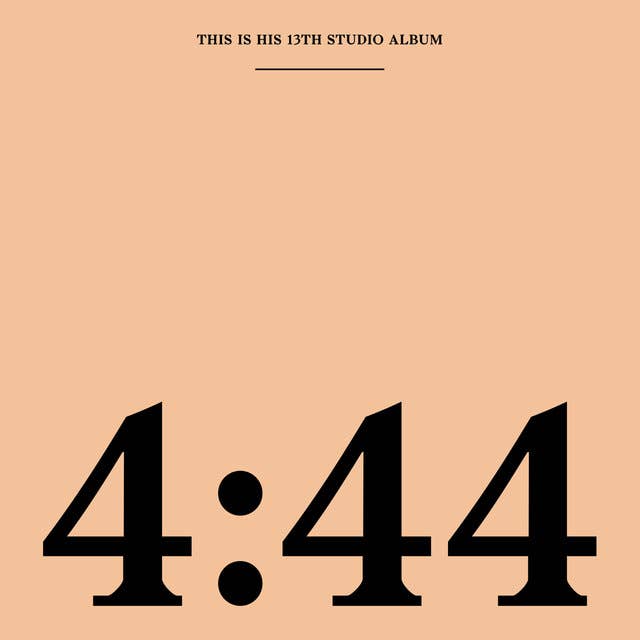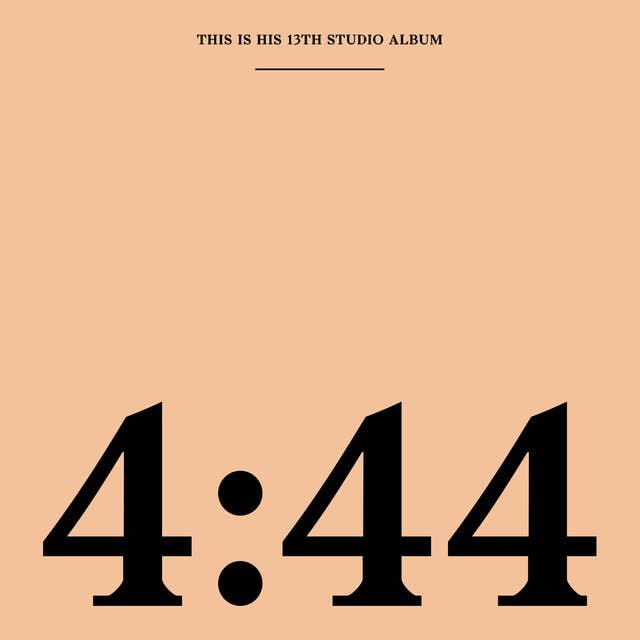
Self-reflection is difficult, especially as we get older, but at the age of 47, Jay-Z decided to have challenging conversations with himself on his thirteenth studio album, 4:44. Hov explained that the name of the album was inspired by the time he saw when he woke up on the night he wrote the title track. The title might be somewhat coincidental, but there is nothing about 4:44 that isn’t purposeful, as Hov spends 10 tracks discussing the importance of generational wealth and investing, embraces his mother for accepting her sexual identity, and dissects how his own ego and infidelities have impacted his marriage. Some have viewed it as the answer to Beyoncé’s critically-acclaimed album Lemonade, but in reality, 4:44 is the result of Jay-Z coming to grips with his reality and going to therapy.
A deeply personal and soul-bearing album like 4:44 is a shining example that there is no time limit for growth, and no age limit for hip-hop. From a lyrical perspective, Hov still manages to find new pockets that can connect to the street entrepreneurs, family-oriented folk, and younger generations alike. Over a dozen studio albums, one retirement, and a few decades deep into his career, Hov still has it. To commemorate the five-year anniversary of 4:44, we decided to rank all of its songs from worst to best. (Note: for the purposes of this list, we focused on the 10 original songs and omitted bonus tracks.)
10. “Moonlight”
View this video on YouTube
4:44 has no skips, but “Moonlight” might be the most forgettable. It’s inspired by the Oscar-winning 2016 film of the same name, and includes cultural commentary on the incident that occurred at the 89th Academy Awards where the white-dominated film La La Land was mistakenly announced as the winner of the Oscar for Best Picture when Moonlight had actually won it. The moment was viewed as a microcosm of how Black actors, directors, and films are viewed as secondary in Hollywood and sparked many conversations about how things need to change in the space, and “Moonlight” adds to that commentary. “We stuck in La La Land/ Even when we win, we gon’ lose/ We got the same fuckin’ flows/ I don’t know who is who,” Hov raps. It works well when viewed through that lens, but as a standalone track, it doesn’t address the central themes of 4:44 as well as other songs on the album do.
9. “Caught Their Eyes”
View this video on YouTube
Jay-Z and Frank Ocean have a collaborative history that spans several songs and albums, and “Caught Their Eyes” adds to their already impressive canon. While the first verse outlines how growing up in the streets can lead to people having trust issues, the second is entirely dedicated to the corruption in the music industry, spurred by Prince’s estate taking the streaming rights of the legend’s catalog from Tidal after he passed away. Hov asserts that this was done out of greed and continues to criticize how his estate began trying to profit off his home and personal belongings as soon as he was gone.
8. “Legacy”
View this video on YouTube
Creating generational wealth has been at the crux of Jay-Z’s career, both in and out of music. “Legacy” is the perfect outro for an album like 4:44 because it re-centers the story to what Jay-Z cares about most: leaving something meaningful behind for his children and family. That’s not just material possessions and physical money, either, but the knowledge and tools necessary to help them strive for goals higher than even he has reached. The track also finds Hov discussing how his aunt being molested by his preacher grandfather made him distrust Christianity as a whole and begin exploring other religions, and how sexual abuse can create trauma that sets entire generations back.
7. “Bam” f/ Damian Marley
View this video on YouTube
“Bam” is the perfect foil for “Kill Jay Z.” Hov spends the entirety of 4:44 establishing that he’s a multifaceted human who is working on coming to grips with the toxic parts of himself that he’s ashamed of, and trying to kill his ego in order to grow as a husband and father. While these themes are important and culminate in the centerpiece of the album (the title track), “Bam” finds Hov reintroducing himself to Jay-Z and reminding himself that “sometimes you need your ego, gotta remind these fools.” “Bam” is just as necessary as “Kill Jay Z” because it centers Hov as always being human, filled with flaws and baggage, despite all of the healing he’s done.
6. “Kill Jay Z”
View this video on YouTube
One of the core motifs of 4:44 is Hov sparring with his ego and embracing Shawn Carter, the loving father and husband, while effectively trying to kill the toxic masculinity and womanizing attributes connected to his stage name. This concept is introduced in the album’s opening moments as “Kill Jay Z,” which finds Hov confronting the aspects of himself and his life that he loathes the most and questioning how “Jay-Z” was created in the first place. “Cry, Jay Z, we know the pain is real/ But you can’t heal what you never reveal,” Hov spits, surmising the main concept of the entire album. Now that he’s a father and has other people relying on him, it’s time to reflect on the lowest points of his life, like shooting his own brother when he was 12, selling drugs to people he loved, and other critical moments that birthed Jay-Z in the first place.
5. “Smile” f/ Gloria Carter
View this video on YouTube
“Smile” reflects one of the biggest moments of personal growth for Hov in his career, from revealing that his mother Gloria Carter was finally able to come out to him in the song’s opening moments to discussing how he’s “mastered his aesthetics” and stayed loyal to the projects that raise him, all while settling into some extremely impressive lyrical pockets. Jay’s proclamation that his mother overcame “society’s shame and the pain” in order to live openly and happily in her sexuality so much later in her life is as warm and endearing as it is profound and brave, especially given how homophobic the rap space has historically been. “Smile” matches the tone of 4:44 because it exudes growth and is open and vulnerable. He also snagged a very rare Stevie Wonder sample, because he’s Jay-Z.
4. “Family Feud” f/ Beyoncé
View this video on YouTube
As much as 4:44 is about Hov owning his infidelities and facing his most toxic traits, it also highlights how much he loves his family and reminds the new generation who the God MC still is. Few songs do that better than “Family Feud.” With Beyoncé stepping in to deliver an angelic chorus, Jay raps about being tempted by “Becky,” a nickname that also pops up on Lemonade. He also raps that “a man that don’t care [for] his family can’t be rich,” acknowledging that his fortune means nothing without the loved one’s he’s meant to provide for. “Family Feud” also challenges the ageism that’s prevalent in rap, illuminating how the old and new generations of hip-hop heads have more in common than they think. “All this old talk left me confused/ You’d rather be old rich me or new you?/ And old niggas, y’all stop actin’ brand new/ Like Tupac ain’t have a nose ring too,” Hov spits, highlighting how generational gaps make it easy to forget that our culture operates in a flat circle, and that trends always come back around even if in the most subtle of ways.
3. “Marcy Me”
View this video on YouTube
There wouldn’t be a Jay-Z if not for the Marcy Projects that raised him, and “Marcy Me” pays homage to his home, featuring some of the best lyrical gymnastics on the album. Using another sample (this time playing into the song’s name by borrowing Marvin Gaye’s “Mercy Me”) Hov takes a trip down memory lane as he reflects on how Marcy shaped him into the man he is today. There are so many complex rhymes in this song, exemplifying how Hov has only gotten better with age, like when he opens the second verse with, “Marcy me/ Streets is my artery, the vein of my existence/ I’m the Gotham City heartbeat.” Here, he morphs “the bane of my existence” into “the vein of my existence” to follow the artery metaphor that preceded it, while also turning “vein/bane” into a double entendre that references the classic Batman villain, making his Gotham City heartbeat line that follows make sense. “Marcy Me” sounds like spoken word backed by a calming instrumental, embodying the essence of hip-hop, all the while illustrating how the harsh streets of Marcy, Myrtle, Nostrand, and Flushing can breed superheroes despite their flaws.
2. “The Story of O.J.”
View this video on YouTube
More than any other song on 4:44, “The Story of O.J.” permeated pop culture, revived unnecessary barbershop debates about investing, and was used as the backbone for one of the biggest diss tracks of the last decade. “O.J. like, ‘I’m not Black, I’m O.J.’ … okay,” Hov sarcastically raps to open the song, referencing something O.J. Simpson allegedly said during his 1995 murder case. Regardless of whether he actually made that statement or not, the quote reflects the perils of thinking that wealth or social status can supersede racial identity. As Hov points out in the song’s chorus and alludes to in the sampling of Nina Simone’s “Four Women,” it doesn’t matter the shade, financial status, or if you’re O.J., white America will still view Black people as lower-class citizens.
At its core, “The Story of O.J.” is also a song about Black capitalism and how Jay-Z believes our community needs to learn how to exploit a system that has exploited us for years. “Financial freedom my only hope/ Fuck livin’ rich and dyin’ broke” Hov raps, echoing many of the themes prevalent on the album. This is a message Hov has been preaching for his entire career, but given the billionaire status he was on the precipice of in 2017, “The Story of O.J.” carries more weight because it has more direct tools and tips that he’s picked up through his time in the game.
1. “4:44”
View this video on YouTube
The most powerful song on 4:44, and one of the most soul-bearing records in Jay-Z’s entire discography, is the title track. Throughout Hov’s two-decade-long career, he’s been called many things: an American gangster, a “business, man,” but none of the titles extended beyond himself the same way a father and husband do. “4:44” not only encapsulates the complexities of Jay-Z and Beyoncé’s relationship, but it also highlights the constantly shifting paradigms within Black love.
The bedrock of Jay-Z’s lyrical legacy lies in his bravado, so to put all of his faults and infidelities on full display is a feat that cannot be understated. In tune with the rest of the album, the topics that “4:44” covers are deeply personal, from Hov blaming himself for the miscarriages Beyoncé suffered because of the stress his cheating induced, to expressing the fear he has about his children learning about his mistakes. But what might speak loudest to the importance of this song (and the misogynistic nature of the music industry as a whole) is the fact that even though Beyoncé addressed Hov’s infidelities nearly outright on Lemonade, she was not universally believed until he owned up to them himself.
A song like “4:44” can only happen after months of therapy and the deep self-reflection of years of unaddressed trauma. It reveals that being drunk in love is fun, but that the stupor that follows the next morning can be more painful and challenging to deal with. It’s a melted painting of love lost and struggling to be regained after it was burnt by dishonesty. This title track is not just Jay-Z’s capitulation because of one Becky or his response to Lemonade, but a deep analysis into every way in which he had failed Beyoncé as a partner, and asking her to allow him to mend their cracked relationship. Despite what it took to get here, however, the most important thing is that Shawn Carter was finally able to arrive.








![As much as 4:44 is about Hov owning his infidelities and facing his most toxic traits, it also highlights how much he loves his family and reminds the new generation who the God MC still is. Few songs do that better than “Family Feud.” With Beyoncé stepping in to deliver an angelic chorus, Jay raps about being tempted by “Becky,” a nickname that also pops up on Lemonade. He also raps that “a man that don’t care [for] his family can’t be rich,” acknowledging that his fortune means nothing without the loved one’s he’s meant to provide for. “Family Feud” also challenges the ageism that’s prevalent in rap, illuminating how the old and new generations of hip-hop heads have more in common than they think. “All this old talk left me confused/ You’d rather be old rich me or new you?/ And old niggas, y’all stop actin’ brand new/ Like Tupac ain’t have a nose ring too,” Hov spits, highlighting how generational gaps make it easy to forget that our culture operates in a flat circle, and that trends always come back around even if in the most subtle of ways.](https://img.youtube.com/vi/z2kEKZ6jyQQ/mqdefault.jpg)


